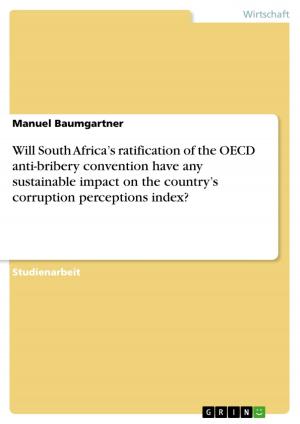Coming to Terms with the Past - Reconciling Gender Issues
Female Protagonists in Male Authored South African Fiction
Fiction & Literature, Literary Theory & Criticism| Author: | Kirstine Steno | ISBN: | 9783656037187 |
| Publisher: | GRIN Verlag | Publication: | October 26, 2011 |
| Imprint: | GRIN Verlag | Language: | English |
| Author: | Kirstine Steno |
| ISBN: | 9783656037187 |
| Publisher: | GRIN Verlag |
| Publication: | October 26, 2011 |
| Imprint: | GRIN Verlag |
| Language: | English |
Bachelor Thesis from the year 2008 in the subject Literature - Africa, grade: BA, University of Copenhagen (Institute of English, Germanic and Romance Studies), course: South African Literature/Postcolonial Studies, language: English, abstract: In the latter part of the 20th and the beginning of the 21st century it has become more and more common for men to write feminine literature. Although this seems like a contradiction, Monica Bungaro points out that 'in principle, men can be feminists,' but as she continues 'they cannot be women.' (Bungaro, 2005: 48) Representing the oppressed Other is always precarious, particularly when you are a member of the oppressing class. Consequently, even the male feminist inherently carries the burden of being an oppressor of women and his representations will necessarily be scrutinized to a larger extend than similar works written by women. In this paper, I will venture an analysis of such male authored representations of the feminine as I explore two male authors' construction of female characters and their 'imagined perspective of the opposite sex.' (Morgan, 1994: 1) For this paper I have chosen to work with the novels Imaginings of Sand by André Brink and Achmat Dangor's Bitter Fruit . These authors represent two different demographics, Whites and Coloreds respectively. Not only do they have different skin colors, they each take departure in two different eras of post-apartheid South Africa. After decades of apartheid rule, the country's first democratic election took place on April 27th 1994. To most South Africans, this day represented the beginning of the new South Africa; the Rainbow Nation that was to unite all races under one democratic government. The euphoria of this truly significant event left its mark on contemporaries such as André Brink who had witnessed the liberation struggle and criticized the apartheid regime for years. The first novel he released after 1994, Imaginings of Sand, is thus marked by the enthusiasm that denominated the time. Brink himself describes the year of publishing as '... a time when the newness has not quite worn off but the euphoria of freedom has begun to give way to a more realistic assessment of where we have come from, where we are now, and where we may be heading for.' (Brink, 1996: 1) [...]
Bachelor Thesis from the year 2008 in the subject Literature - Africa, grade: BA, University of Copenhagen (Institute of English, Germanic and Romance Studies), course: South African Literature/Postcolonial Studies, language: English, abstract: In the latter part of the 20th and the beginning of the 21st century it has become more and more common for men to write feminine literature. Although this seems like a contradiction, Monica Bungaro points out that 'in principle, men can be feminists,' but as she continues 'they cannot be women.' (Bungaro, 2005: 48) Representing the oppressed Other is always precarious, particularly when you are a member of the oppressing class. Consequently, even the male feminist inherently carries the burden of being an oppressor of women and his representations will necessarily be scrutinized to a larger extend than similar works written by women. In this paper, I will venture an analysis of such male authored representations of the feminine as I explore two male authors' construction of female characters and their 'imagined perspective of the opposite sex.' (Morgan, 1994: 1) For this paper I have chosen to work with the novels Imaginings of Sand by André Brink and Achmat Dangor's Bitter Fruit . These authors represent two different demographics, Whites and Coloreds respectively. Not only do they have different skin colors, they each take departure in two different eras of post-apartheid South Africa. After decades of apartheid rule, the country's first democratic election took place on April 27th 1994. To most South Africans, this day represented the beginning of the new South Africa; the Rainbow Nation that was to unite all races under one democratic government. The euphoria of this truly significant event left its mark on contemporaries such as André Brink who had witnessed the liberation struggle and criticized the apartheid regime for years. The first novel he released after 1994, Imaginings of Sand, is thus marked by the enthusiasm that denominated the time. Brink himself describes the year of publishing as '... a time when the newness has not quite worn off but the euphoria of freedom has begun to give way to a more realistic assessment of where we have come from, where we are now, and where we may be heading for.' (Brink, 1996: 1) [...]















